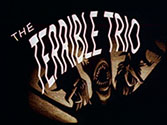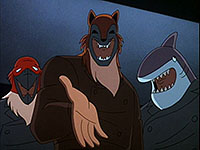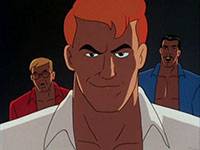|
||
|
| Credits | Cast | |
Story by Alan Burnett & Michael Reaves Teleplay by Michael Reaves Directed by Frank Paur Music by Shirley Walker Animation by Jade |
Kevin Conroy as Bruce Wayne Loren Lester as Dick Grayson Hector Elizondo as Fallbrook David Jolliffe as the Vulture |
Khrystyne Haje as Rebecca Fallbrook Lauri Johnson as Nurse Bill Mumy as the Fox Peter Scolari as the Shark |
|
So sardonically observes the ever-mordant Macaulay Conner in Philip Barry's The Philadelphia Story. The class he observes is one with too much time, too much money, and not enough to do with either. The privileged class' greatest privilege is thus its greatest challenge: What do you do with yourself when there's absolutely nothing that you must absolutely do? Recall that "billionaire" Bruce Wayne is a member of just that class, and you can get the uncomfortable feeling that Wayne's greatest misfortune has, in a round-about way, been to his great good fortune: His childhood tragedy has bequeathed him an expensive, time-consuming hobby on which he can lavish his excess time and excess wealth. Indeed, we are so used to thinking of the Wayne billions as a plot device that we overlook its implications for his character: He has become Batman in large measure because he has the resources to become Batman and would have needed something to do with himself anyway. Touched on only briefly in "Perchance to Dream," this aspect of his existence is put on negative display in "The Terrible Trio," where a batch of bored, rich layabouts consciously decide to get their thrills by embarking on a crime spree. And plainly we are meant to see a comparison between the trio and Bruce Wayne, and to see Bruce Wayne as a "superior" being (as the Fox unintentionally asserts). Grant all this, however, and you still haven't touched on the essential question: What is it that makes him superior? It is not enough to explain that the "Terrible Trio" (deplorably) commit crimes while Batman (admirably) prevents them and/or apprehends the criminals. For while that touches on the superiority of Wayne's actions, it does not touch on the superiority of his character, and so just invites the further question: What is it in their characters or motives that explains the difference in their actions? So the episode concentrates on the characters themselves. Why do the Trio commit their crimes? Perhaps out of sheer boredom—having conquered every other challenge on land, sea or sky, they turn to crime for its thrill value. But remember: it is one of the seeming implications of "Perchance to Dream" that even Wayne himself would be too easily bored without his life as Batman; anyway, obsession (the usual explanation for his donning the mantle of Dark Knight) is not a noticeably admirable virtue. Perhaps recognizing that Wayne, stuck up there in stately Wayne Manor, is as prone to boredom as the rest of us, the episode loads up the Trio with class arrogance: a Leopold and Loeb–like disdain for conventional morality. (Hence, all the talk about "superiority.") But again, how is Batman noticeably superior in this regard? "I am Vengeance," Batman famously declares, thus appropriating to himself an indulgence often explicitly reserved to God. Reflect on this and ask, Who really has the delusions of superiority?
I don't think it had to be this way. For Wayne's superiority lies not in his motives or psychology, but in his moral seriousness, while the Trio's true essence lies in their frivolousness; where Wayne suffers, and knowingly suffers, and returns night after night to assume part of the pain of a suffering world, the Trio pursue pleasure and pleasure only. What fun this episode could have had if it had concentrated on the fun the Trio are having, exulting (with blind and heedless innocence) in their cleverness and athleticism. And what depth it might have taken on as it quietly showed us Batman at work, witnessing the suffering they cause and ignore, clearing up their wreckage and righting their wrongs, and stealthily plotting their capture, humiliation and ruin. |
|
|
|
Related Episodes |
What Others Are Saying ... |
| Back to The Strange Secret of Bruce Wayne |
Forward to Terror in the Sky |



